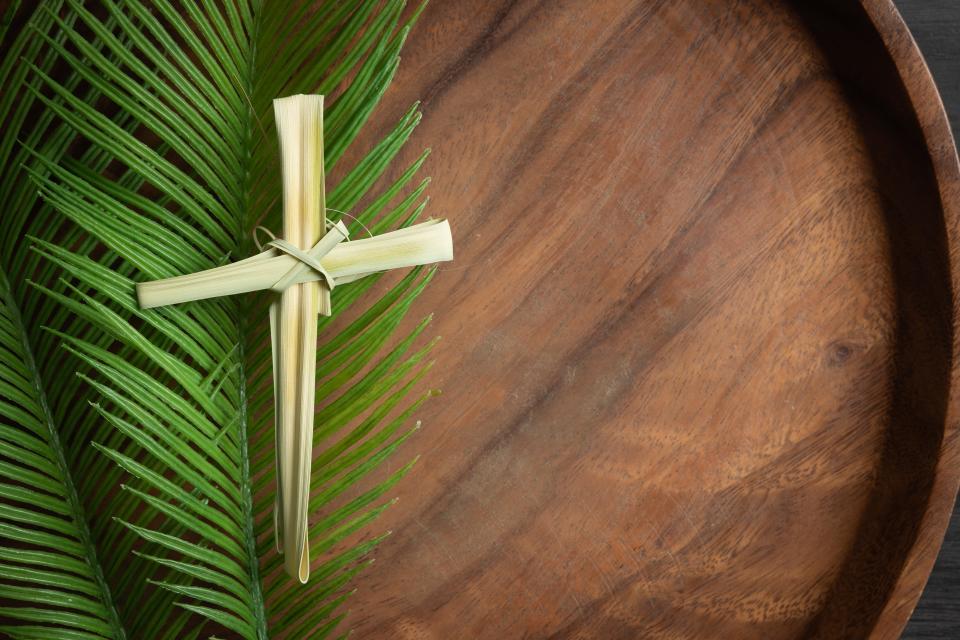Palm Sunday is here: What the Holy Day means for Christians
Holy Week kicks off this weekend and Christians are preparing for Palm Sunday, which honors the last days of Jesus, his trial and crucifixion.
Palm Sunday is celebrated on the first day of Holy Week, the Sunday before Easter. This year, the Palm Sunday falls on March 24.
Christians celebrate the holiday by distributing blessed palm leaves among the congregation of the church.
Traditionally, churches will keep some of the blessed palms, burn them to ash and use the ashes for Ash Wednesday the next year and churchgoers will keep the leaves of the palms and fold them into crosses. But palm leaves are always involved in the celebration.
Christians around the world celebrate Palm Sunday to mark the beginning of the journey that ends with Jesus' death and resurrection, said Mark Jobe, president of the Moody Bible Institute and founding pastor of the New Life Community Church in Chicago.
According to the gospels, Jesus rode a donkey into Jerusalem and people welcomed him as their king with palm branches, said Jobe. People thought he'd release them from Roman oppression, but Roman soldiers crucified him days later.

What do palm branches symbolize on Palm Sunday?
The large, long palm branches were common in the Holy Land, Jobe said. During ancient times, they symbolized goodness and victory.
"It wasn't something unique to Jesus," he previously told USA TODAY. "When kings would come to town or when conquering warriors would come in, they would welcome them with palm branches, which they would throw on the ground in front of them."
And during Grecian Games, winners would be welcomed with the branches, too, he said.
Why do Christians celebrate Palm Sunday?
According to Jobe, the book of Luke states that as Jesus approached the cheering crowd that welcomed him, he saw that his people wanted political peace but were in desperate need of "spiritual peace."
"Palm Sunday makes no sense unless you understand that shortly after, Jesus would die and pay the price for anybody, no matter prostitute or religious person, to forgive their sins and to give them an entrance into a new kingdom called the kingdom of Heaven," Jobe said.
Jesus entered the city knowing he'd be crucified, Bishop Vashti McKenzie, interim president and general secretary of the National Council of Churches, told USA TODAY.
"The first chapter in Genesis talks about how God created the world," said McKenzie. "Palm Sunday begins the journey of how God saved the world through the death and resurrection of Jesus."
When was the first Palm Sunday?
After the first celebration in the gospels, the first recorded Palm Sunday dates back to the 4th century in Jerusalem, Jobe said. The ceremony wasn't introduced to Western Christianity until about the 9th century.
What does the donkey symbolize?
According to Jobe, Conquering kings typically rode in chariots or on the back of stallions, so Jesus riding a donkey went against the norm.
The donkey, he said, was a symbol of peace but it also represented the fulfillment of a prophecy from Zechariah 9:9.
"Your king comes to you, righteous and victorious, lowly and riding on a donkey, on a colt, the foal of a donkey," the chapter reads.
The donkey is also a symbol of humility, said McKenzie, from the National Council of Churches.
What do modern Palm Sunday celebrations look like?
Today, Palm Sunday celebrations vary according to the denomination.
Some people wear red or purple that day, Jobe said.
Churchgoers sing praise songs and lift palm branches of various sizes at the "very celebratory worship service," said McKenzie.
The branches are blessed and some families take them home, placing them on desks or shelves to remember the event.
"Traditionally, some of the branches are saved," she said. "They're not given out to people. They are saved and when you get to Ash Wednesday, which is the beginning of Lent, the ashes come from those burnt palm branches."
She stressed a true understanding of why Christians celebrate Palm Sunday.
"It is a time of celebration," she said. "Jesus died on the cross and when he died on the cross, he died for all of us, not for some of us, not for a few chosen few, but all of us."
Julia is a trending reporter for USA TODAY. She has covered various topics, from local businesses and government in her hometown, Miami, to tech and pop culture. You can follow her on X, formerly known as Twitter, Instagram and TikTok: @juliamariegz.
Saleen Martin is a reporter on USA TODAY's NOW team. She is from Norfolk, Virginia – the 757 – and loves all things horror, witches, Christmas, and food. Follow her on Twitter at @Saleen_Martin or email her at [email protected].
This article originally appeared on USA TODAY: What is Palm Sunday? What it means for Christians, why it's celebrated
